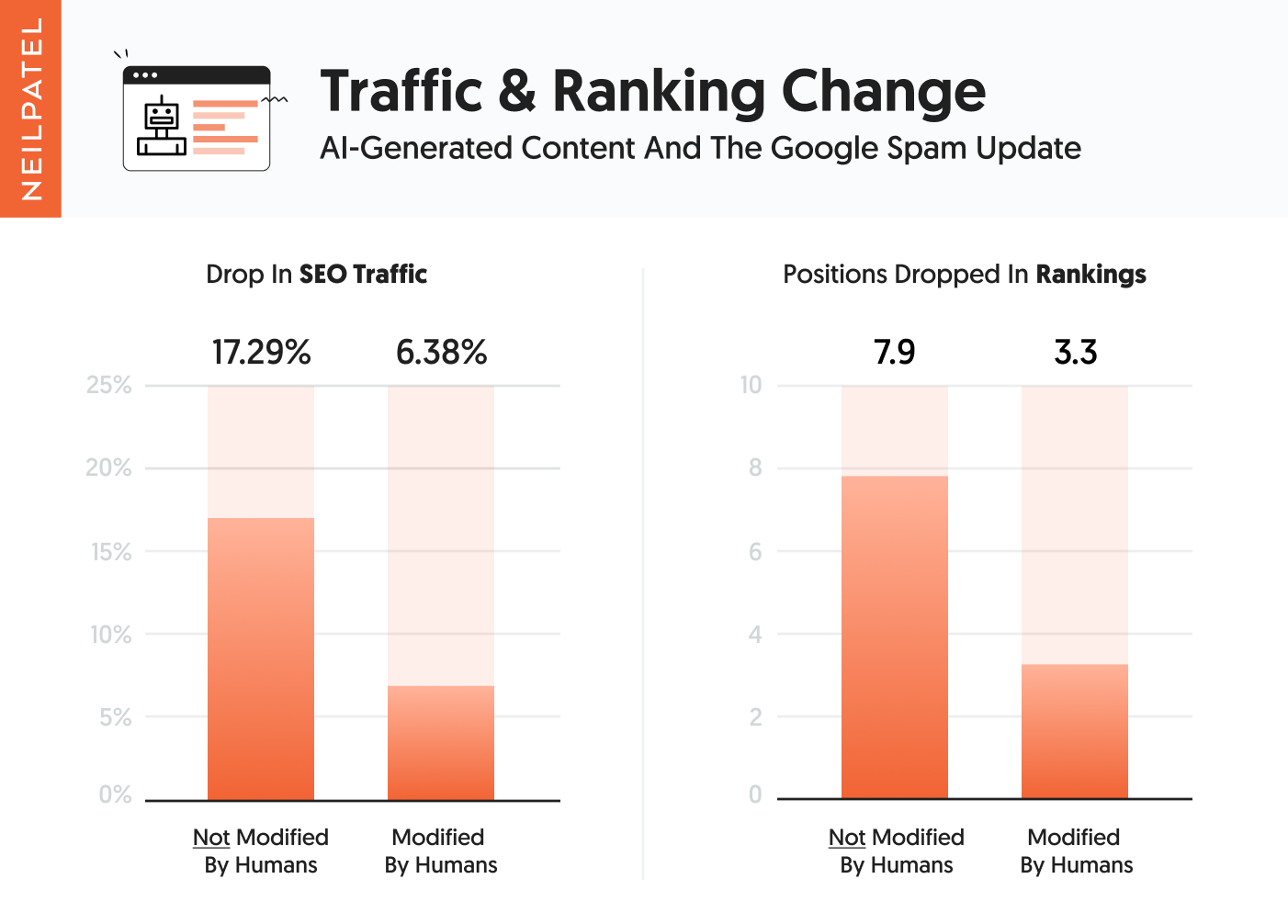![]()
Image generated using DALL·E 2
Google has already announced, via Danny Sulivan, that AI-generated content is indeed legitimate content, as long as it's made for people and not search engines. But if you're using services like ChatGPT to spin out articles in the hopes of gaming the system, well Google's already on to you. Neil Patel showed this in the impact of the Spam update last October, where his sites with AI-generated content suffered a significant hit.
 Source : https://neilpatel.com/blog/googles-spam-update/
Source : https://neilpatel.com/blog/googles-spam-update/
It was shortly after this update, in November 2022, that ChatGPT, the latest and public version of the chatbot project from OpenAI, exploded onto the scene. The company shifted from their original non-profit origins to a for-profit model, with Microsoft investing over a $1 billion in the project in 2019 and now rumored to be looking at injecting a further $10 billion.
This is, as much as the name would have us think otherwise, a for-profit business aimed at leveraging AI technology, which has over the years iterated versions of its Generative Pre-Training (GPT) model technology to bring us DALL·E and ChatGPT.
My hope was to have ChatGPT write some of this article or at least include some interesting snippets. Unfortunately it’s currently offline due to the sheer volume of requests, which tells you something about its success, reaching over 5 million users within 5 days of launch.
It’s worth noting that the latest iteration of GPT (GPT 3.0), the technology behind ChatGPT, is licenced exclusively to Microsoft and has been since the deal was struck in September 2020. Unsurprisingly, after ChatGPT’s phenomenally successful launch, it wasn’t long before Microsoft announced plans to integrate it into Bing.
Which leads us nicely to thinking about what the impact on search might be, with Microsoft insiders saying it may be live in Bing as soon as March this year.
The GPT-3 technology which Microsoft have that exclusive license for not only powers DALL·E for image generation but also CLIP, which instead of generating images from text descriptions gives you descriptions for images. Something that could very quickly give Bing far better image search capabilities. Perhaps in a somewhat similar way to Google Lens.
The parallels for what Bing might be able to do in comparison to Google don’t end there. If you were wondering what Google might do with this technology, well they told you outright back in May 2021 in their ‘MUM’ and ‘LaMDA’ posts. We covered both of these in our Google’s New Technologies post. What’s interesting is that Google has split these into two distinct technologies, LaMDA is the ChatGPT-esque chatbot:

However, this isn’t the part that integrates directly into the search results, that’s driven by MUM:

The thing is, GPT models aren’t going to make very good search engines, not on their own. They are static models that take months (or years) to train and require huge, intensive amounts of resource. You cannot simply ‘add’ new information to the model. It would need to be retrained to include it. That’s a little tricky if you want a search engine that can include the latest, constantly changing information. Simply put, you cannot just hook ChatGTP up to the internet and make a search engine.
ChatGPT can serve as an amazingly effective human / search interface. It can be a layer between us and the indexed information. But you would still need something behind it that acts more like a traditional search engine, finding and ingesting content that can then be shown to, for instance, ChatGPT which could then give you a summary of what it found.
With MUM Google appears to me to be working to create that layer, so you can have a more conversational search experience. LaMDA in Google’s case or ChatGPT in Bing’s, will be the part that allows the conversation to happen.
Here’s another interesting example from Google of using the technology to show it an image and then ask questions about it:

The concern that I see most often from webmasters is, well if ChatGPT can give people the answer why would they need to visit my content? That’s going to be an issue for informational queries - whether for monetized sites where clicks lead to rewards from ads, or non-monetized sites where people have devoted time to creating informational material just for the satisfaction of knowing others will find and read it. This is the model which appears to be most at threat from GPT-type models which will provide this sort of static or infrequently updated information right there on the page, without attribution.
Trying to generate that attribution may well be a lost cause when they are effectively a black box:
The opacity of NLP models, in particular, makes training and deployment of models like T5 and GPT-3 extremely difficult since they are opaque in their knowledge representation and backing claims with provenance.
https://analyticsindiamag.com/is-there-an-antidote-to-the-black-box-problem-of-nlp/
Where each point of information is arrived at from thousands upon thousands of data points, how would you attribute any piece of information given by one?
The model works brilliantly as a research tool, which is ultimately the most useful way of looking at ChatGPT - it’s a really good librarian. Its library is the GPT model and the librarian, ChatGPT, will tell you about anything in it and you can have a nice chat along the way.
You can feed ChatGPT new information held in a session. Within that session it will know what you have given it and can relay information back about it. But that information is held only within that session, it doesn’t get passed back into the library for everyone else. Much like you can tell the librarian about your day, but they aren’t going to write it up and add it to the bookshelves for everyone else to read, as it could be a load of rubbish.
So is ChatGPT going to be the end of SEO? Probably not.
Are these types of technologies going to change how we interact with Search Engines and therefore SEO? Absolutely. They already are.